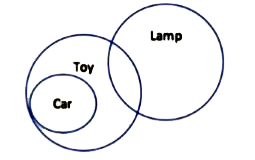In each of the following questions, some statements are given and these statements are followed by two conclusions numbered I and II. You have to take the given statements to be true even if they seem to be at variance from commonly known facts. Read the conclusions and then decide which of the given conclusions logically follows from the given statements disregarding commonly known facts.
Statements:
All cars are toys.
Some toys are lamps.
Conclusions:
I. Only a few cars are lamps.
II. Some cars are not toys.
Only conclusion I is true
Only conclusion II is true.
Either conclusion I or II is true
Neither conclusion I nor II is true.
The correct Answer is:D
Similar Questions
The B.D. whose mean is 3 and variance is 2, is given by .....
View Solutionयदि 2x+5y−6z+3=0 एक समतल का समीकरण हो, तो दिए गए समतल के समांतर समतल का समीकरण होगा
View Solutionनिम्नलिखित कथनों पर विचार करें :
कथन I : →a=2→i−3→j+→k और →b=5→i+2→j−4→k परस्पर लंबवत है
कथन II : →a×→b=0
View Solutionनिम्नलिखित कथनों पर विचार करें :
कथन I : यदि A और B प्रतिदर्श समष्टि S के संगत दो घटनाएँ ऐसा है कि P(A)=0.2 और P((B)=0⋅8 तो A⋃B एक सुनिश्चित घटना है |
कथन I : यदि A और B परस्पर अपवर्ती हों तो P(A)+P(B)=1 इन कथनो में :
View Solutionनिम्नलिखित कथनों पर विचार करें :
कथन I : माना कि ddx{f(x)+c}=F(x) तब ∫F(x)dx=f(x)+c
कथन II : समाकलन, अवकलन का प्रतिलोम प्रक्रम है | इन कथनो में :
View Solutionनिम्नलिखित कथनों पर विचार करें :
कथन I : माना कि f:N→Y एक फलन है, जो f(x)=9x+3 द्वारा परिभाषित है, जहाँ Y={y:y=9x+3,x∈N} तो f एकैकी फलन है |
कथन II : x1,x2∈N के लिए f(x1)=f(x2)⇒x1=x2 इन कथनो में :
View Solutionनिम्नलिखित कथनों पर विचार करें :
कथन I : f(x)=4x3+9x2−12x के लिए स्थानीय अधिकतम का बिंदु है x=-2
कथन II : 'f(−2)=0 और f''(−2)>0. इन कथनो में :
View Solutionपरासरण दाब (π), आयतन V व ताप T के लिए निम्न में से कौन-सा कथन सत्य है-
View Solution

